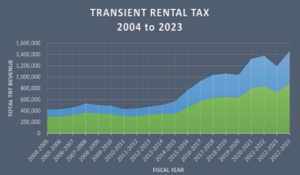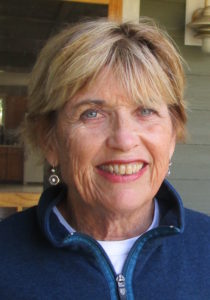By GARRET JAROS/YachatsNews
YACHATS – There appears to be little question whether Yachats will raise its lodging tax on motels and vacation rentals. What is undecided is the percentage increase and when it might take effect.
The subject of raising the city’s 9 percent room tax, which is the biggest source of revenue for the city, came up during a Thursday work session of the Yachats city council.
Four years ago the city council – although made up of entirely different members – proposed increasing the tax to 10 percent but backed off after pushback from motel owners and the Yachats Chamber of Commerce. Yachats is also one of three Oregon cities with a 5 percent tax on prepared food and beverages.
On Thursday, mayor Craig Berdie opened the discussion by noting that last month voters approved Lincoln County increasing its lodging tax from 10 percent to 12 percent. The county is required by its charter to ask voters to raise its lodging taxes. Cities do not have to seek voter permission.

“Every other city in the county is at either I believe 11 or 12 percent,” Berdie said. “We are now at 9 percent and below other municipalities. The question then is should we be considering that and what are the pros and cons of raising our vacation rental tax to the 12 percent that’s more common in the county?”
Newport, Lincoln City and Depoe Bay have a 12 percent lodging tax and Waldport’s is 10 percent. On top of that there is also a 1.5 percent tax charged by the state of Oregon that goes to Travel Oregon, the state’s tourism-promotion agency.

Revenue from lodging taxes in Yachats have also risen steadily the past 10 years. In fiscal 2017-18, the city took in $1.04 million. In 2022-23 it was $1.4 million. Nearly 60 percent of that can go into the city’s general fund; the remaining 40 percent has to be used for tourism promotion or tourism-related projects. There are seven motels in Yachats and the city can license up to 125 vacation rentals.
The discussion
Councilor Barry Collins questioned whether it might be better to raise the rate by a smaller increment and then increase it on a more regular basis so the rate doesn’t fall behind other municipalities.
“Should we jump three points now or just go up to 10 or 10.5 and we’ll look again next year?” Collins said “To me, that seems a little more thoughtful and less disruptive possibly.”
Councilor Mary Ellen O’Shaughnessey agreed.
Berdie said he has no problem with raising it to 12 percent, but suggested city staff come back with a report detailing the city’s current revenue from lodging taxes and what could be raised at 10, 11 and 12 percent.
“And then we can make a decision based on that,” he said. “And it would also be helpful to see exactly where each city is at … and then a recommendation in form of a resolution that we could amend or vote on.”
“The question would be, I think if I were a hotel owner would be is this going to impact my bookings?” Berdie said. “And well, from talking to at least one, they said, ‘No.’ It’s common, people expect to pay it, they’re paying it everywhere else they go. It’s not the deciding factor in whether people book here or not.”

But O’Shaughnessey said while it’s good that the city should gather data “I don’t think we do something just because some other city is doing it, and that’s what I hear you saying.”
Collins then noted the lodging tax is one of the city’s “primary sources of income” and that with all the projects the city is considering, it could certainly use more funding.
“So, I am leaning toward the mayor’s position of let’s keep up with the going rate rather than just wait until we are hungry before we eat,” Collins said.
Councilor Greg Scott was mindful of the impact an increase will have on those collecting the tax.
“We need to keep in mind if we’re talking about changing the rental tax, we need to give the people involved time to make the changes in their accounting systems,” Scott said. “So there’s some lead time involved here.”
The city would need to communicate the change to businesses and figure out the timetable for its implementation, he said.
“Ideally, the optimal time would have been to do it effective like Jan. 1,” Scott said. “So given the time that this thing is going to work through, the more we’re getting into the busy season, the more problematic it’s likely to be for organizations that are collecting the tax. Just be aware of that.”
The city’s 2023-24 budget projects it will collect $1.35 million in lodging taxes from motels and vacation rentals. That estimate is purposefully conservative as it is $500,000 less than what was collected in 2022-23.
Camping ordinance
In other business Thursday, the council moved forward during its regular session with a final draft of its homeless camping ordinance.
The ordinance outlines where camping is allowed and under what circumstances, namely that the “property involved is zoned industrial, public facility or commercial and the property owner has registered the temporary camping location with the city; and the city may require the site be part of a supervised program operated by the owner or its agent.”
The council has been steadily working toward establishing an ordinance so it can enforce where camping is prohibited.
The list of prohibited places is extensive but includes: Between West Fourth and Seventh streets, Oceanview Drive, La-de-da Lane, the green space, forest, boardwalk and wetlands west of city hall, all city parks, the Little Log Church Museum, Commons, library and city hall.
While the city does not have a code enforcement officer, the ordinance “allows us to place a no camping sign and we can call the sheriff,” Berdie said.
- Garret Jaros is YachatsNews’ full-time reporter and can be reached at GJaros@YachatsNews.com



Have the Councilors considered the impact of the lodging tax on less wealthy visitors, many of whom work very hard and who long for a couple of nights on the coast with their kids in order to recharge before plugging back into the daily grind? Lodging on the coast is increasingly out of reach for low to middle earners due to the total cost of securing a room and meals. While lodging is a seller’s market in beautiful coastal towns, that doesn’t mean we shouldn’t consider the needs of less financially well-off visitors and the positive ripples that a night or two visiting Yachats can bring. Just because we can charge more taxes, that doesn’t mean we must charge more taxes. Widening the cost-benefit analysis to include the costs and benefits of meeting the needs of working folks in our state & region through the sharing of its myriad gifts of this place might be worth doing. It would be an unconventional consideration, but is increasing accessibility for a wider economic swath of the population not an aspect of the La De Da spirit? Make life better.
Agree.
I like O’Shaughnessey’s thinking and comment about just because someone else is doing/charging something doesn’t mean that Yachats needs to do that. Curious how Yachats rates in terms of property taxes compared to other cities in the county. Do we aim to match the highest rate?
If a hotel room costs $100, raising the tax from $9 to $12 is not going to be a significant difference to discourage anyone from visiting. Out of town visitors impose significant costs on local people because of the cost of policing, cleaning up trash, and increased sewage treatment and water costs, and all sorts of other services needed to serve them. They don’t pay what they should. I believe tax increases should be aimed as much as possible at tourists.
Getting to tax like California, which most people left due to high taxes
Working folks can do what I used to do – travel during off season. I was to still enjoy the beautiful coast at a fraction of the cost. Why do people constantly feel the need to cripple a city’s ability to provide services that these same people need? You talk about how much more things cost you? Well, what do you think it costs a city to provide the services we need? Where do they get that money? How about they stop fixing roads, fixing plants and letting things silde? Bet you’ll want the taxes then.
I believe I was on the Council four years ago that considered the lodging tax increase. It’s worth mentioning that at the time, other municipalities in Lincoln County were roughly on par with that.
Since then, Lincoln City raised its lodging tax from 9.5% to 12% this year, while Newport raised theirs from 9.5% to 12% in 2021.
It’s reasonable for Yachats to increase its lodging tax accordingly at this stage, especially considering how generously the City supports the Chamber and has been investing in other tourism-facing projects.